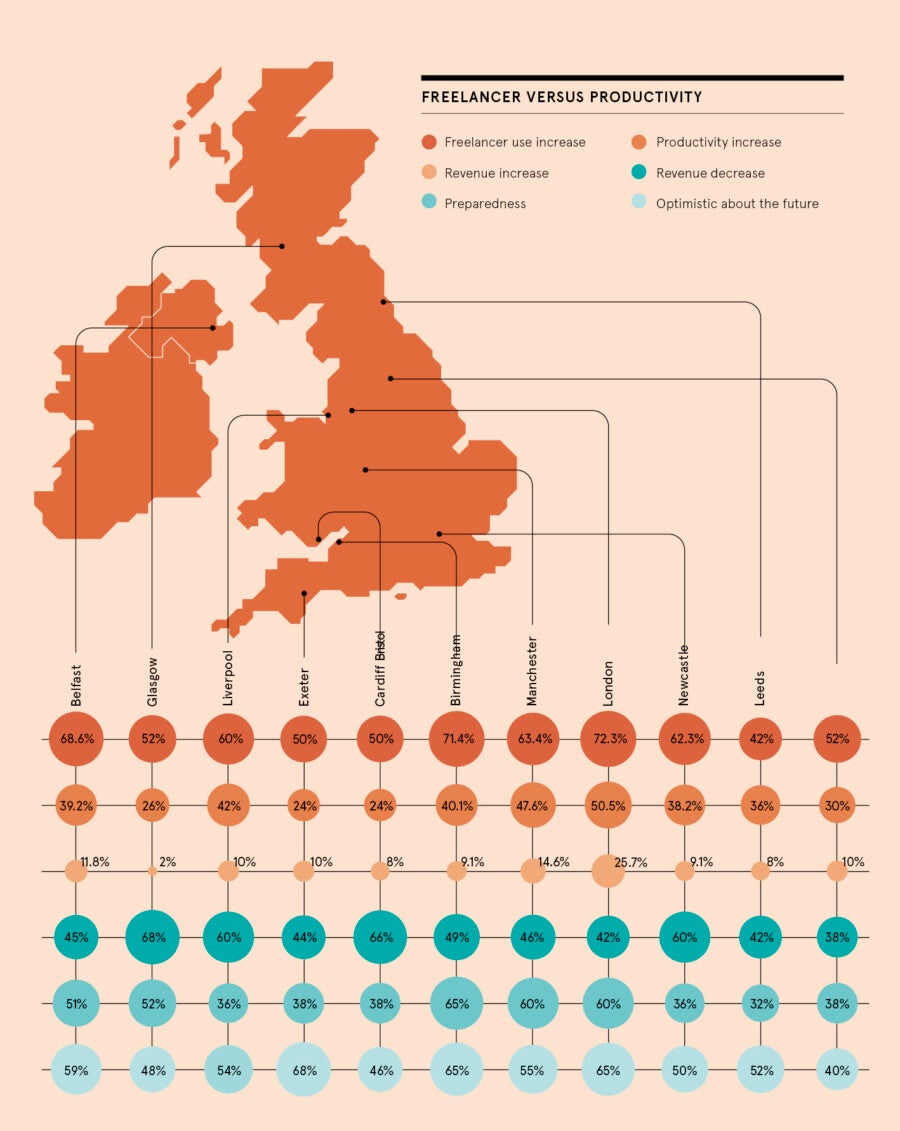The UK’s economy is heavily reliant upon the health and success of small and medium-sized enterprises (SMEs), which make up 99.9 per cent of the nation’s business population of 5.9 million private sector organisations, according to the latest government figures from January.
The coronavirus pandemic has forced SME leaders to rethink their workforce, with staff furloughed or made redundant. However, a majority of these businesses have turned to freelancers to assist in this challenging period as they look to survive and pivot, new research from Fiverr highlights.
Some 58 per cent of the 1,000 SMEs from all over the country we polled for our Remote Work Whitepaper, published earlier this month, are working with freelancers more than before the COVID-19 outbreak. Moreover, 42 per cent of respondents have found freelancers more productive than regular staff.

These figures are no surprise to us at Fiverr and the surge of demand for freelancers has been reflected on our platform. We have been inundated with new orders from businesses and also, with people finding themselves without a regular job, many more freelancers, with a wide range of skills, have signed up.
The argument for utilising freelancers is irresistible given the current situation. They are used to remote working, collaborating within teams, hitting deadlines, and they work hard to both retain custom and boost their all-important reputation. Indeed, it’s the agility of freelancers that is now most attractive and we believe this trend will continue.
For the last decade, the freelance market has been a tap for businesses to turn either on or off, quickly and without any long-term commitment. Online platforms such as Fiverr have significantly reduced the time it takes to link a freelancer with a business, too. Until recently, if a company wanted to find a skilled freelancer offline, it would take two weeks or so of negotiation before the scope of work and price were agreed. Our platform connects people in a couple of clicks. We say: “You can find a freelancer in five minutes.”
This speed and ease of finding people with expertise are critical for many SMEs. Because of the pandemic, taking offline online is a hot topic. Many entrepreneurs using Fiverr, including restaurant and pub owners, clothes retailers and many more, ask me about it and most of them feel unprepared to pivot to a completely digital offering. They all want to shift online as quickly and as efficiently as possible. Now they can launch a website in a week, whereas before it might have been on the “nice-to-have list and staggered over three months, if at all.
Constructing the framework for ecommerce may be made easier than ever, by Shopify, Squarespace, Wix, WordPress and so on, but they only provide plug-and-play websites. To reap the best rewards, businesses require expertise to know how to sell products and services and generate clicks on their website. This is where freelancers can add considerable value. This includes product descriptions, editing and selecting photographs, and search engine optimisation (SEO). In addition, there is social media, digital marketing and advertising campaigns.
Our mission remains to support the shift to freelancers
Alongside the offline-to-online trend, there is also e-learning, with furloughed or recently unemployed workers looking to upskill and offer their services as freelancers. Our e-learning arm Fiverr Learn has been off-the-hook busy, with both business owners and freelancers seeking to expand their knowledge.
An SME leader might never be an SEO expert, for instance, but by taking a short course, they will become familiar with the ins and outs, can communicate with a freelancer and know they are achieving value for money.
In late May, chancellor Rishi Sunak warned that the UK is facing a “severe recession the like of which we’ve never seen”. Given this prospect, it’s highly likely the tap for freelancers will be turned on for some time. Businesses need to prepare as best they can to survive and hopefully thrive. The regrettable reality is most SMEs will be unable to retain or rehire furloughed staff.
Now, though, thanks to the rise of the freelancer, you don’t need all your workforce to be full-time hires. Costs and time can be drastically reduced thanks to freelancers, making businesses more dynamic and allowing leaders to become more creative with how to make money.
Freelancer platforms, such as Fiverr, offer hope, even when things look dire. We support businesses and provide talented freelancers at every price point. Even if you have a tight budget, you will gain value for money. Fiverr, founded ten years ago, has had more than 50 million transactions and paid out $1 billion to freelancers. We are sure this model, built on the surging freelancer market, is the future of work. And now the numbers validate our core belief.
A decade ago, Fiverr set out to democratise entrepreneurship and build for a future we knew was coming. Although recent events have accelerated the change in the world of work, our mission remains to support the shift to freelancers and, like the businesses and people we partner with, we continue to grow and evolve. For freelancers the supposed “new normal” has been their normal for long before COVID-19. That’s why they are the future of business in the UK.
For more information please visit fiverr.com
Read Fiverr’s Remote Work Whitepaper here.






